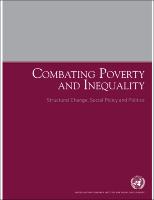| dc.description.abstract | Poverty reduction is a central feature of the international development agenda and contemporary poverty reduction strategies increasingly focus on “targeting the poor”, yet poverty and inequality remain intractable foes.
Combating Poverty and Inequality argues that this is because many current approaches to reducing poverty and inequality fail to consider key institutional, policy and political dimensions that may be both causes of poverty and inequality, and obstacles to their reduction. Moreover, when a substantial proportion of a country’s population is poor, it makes little sense to detach poverty from the dynamics of development. For countries that have been successful in increasing the well-being of the majority of their populations over relatively short periods of time, the report shows, progress has occurred principally through state-directed strategies that combine economic development objectives with active social policies and forms of politics that elevate the interests of the poor in public policy. | |

